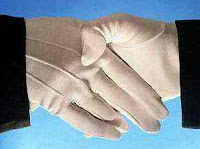The Ceremonies of the Freemasonic Rites Described
 Baronius Press have re-published Walton Hannah's classic book: "Darkness Visible. A Christian appraisal of Freemasonry." At the time of writing the book, Hannah was an Anglican clergyman. He was later received into the Catholic Church.
Baronius Press have re-published Walton Hannah's classic book: "Darkness Visible. A Christian appraisal of Freemasonry." At the time of writing the book, Hannah was an Anglican clergyman. He was later received into the Catholic Church.In 1951, Hannah wrote an article in the journal Theology, entitled "Should a Christian be a Freemason?" which caused considerable controversy in England, particularly since King George VI and the Archbishop of Canterbury, Geoffrey Fisher, were both freemasons. As a result, the Church Assembly of the Church of England later that year discussed the issue. The Rev R Creed Meredith, a freemason himself, proposed that a commission be appointed to report on Hannah's article. This was overwhelmingly rejected and the Assembly did not reach any particular decision on the matter.
Following this, Hannah wrote "Darkness Visible". In the first part of the book, he explains how he obtained his information about the masonic rites (primarily from rituals and commentaries published by freemasons), and why he was writing it: to give accurate information to enable Christians to make an informed judgement on whether or not freemasonry was compatible with their Christian faith.
He argues that it is not compatible, for two principal reasons. First, because the oaths that are taken on the Bible in an atmosphere of religious solemnity constitute either vain or rash swearing (depending on whether the person takes them seriously or not) and secondly that freemasonry is in fact a "common denominator" religion in which worship is offered to God in forms which exclude Christ.
Part II, the detailed description of the rituals of freemasonry covers about two-thirds of the book. It is a kind of "Fortescue for Freemasons" though, to be honest, Fortescue is like a racy blockbuster by comparison. Apparently it is valued by some freemasons as a clear and accurate guide to the various rites!
Hannah offers a sober, well-balanced appraisal, free from wild conspiracy theories and focussing on the principal reasons why Christians should not join "the craft". He refers sympathetically to the various Catholic condemnations of freemasonry along with those of several non-Catholic Christian bodies.
In case anyone needs to know the Catholic Church's current discipline in the matter, here is the full text of Quaesitum Est, the 1983 Declaration from the Congregation for the Doctrine of the Faith:
CONGREGATION FOR THE DOCTRINE OF THE FAITH
DECLARATION ON MASONIC ASSOCIATIONS
It has been asked whether there has been any change in the Church’s decision in regard to Masonic associations since the new Code of Canon Law does not mention them expressly, unlike the previous Code.
This Sacred Congregation is in a position to reply that this circumstance in due to an editorial criterion which was followed also in the case of other associations likewise unmentioned inasmuch as they are contained in wider categories.
Therefore the Church’s negative judgment in regard to Masonic association remains unchanged since their principles have always been considered irreconcilable with the doctrine of the Church and therefore membership in them remains forbidden. The faithful who enrol in Masonic associations are in a state of grave sin and may not receive Holy Communion.
It is not within the competence of local ecclesiastical authorities to give a judgment on the nature of Masonic associations which would imply a derogation from what has been decided above, and this in line with the Declaration of this Sacred Congregation issued on 17 February 1981 (cf. AAS 73 1981 pp. 240-241; English language edition of L’Osservatore Romano, 9 March 1981).
In an audience granted to the undersigned Cardinal Prefect, the Supreme Pontiff John Paul II approved and ordered the publication of this Declaration which had been decided in an ordinary meeting of this Sacred Congregation.
Rome, from the Office of the Sacred Congregation for the Doctrine of the Faith, 26 November 1983.
Joseph Card. RATZINGER
Prefect
+ Fr. Jerome Hamer, O.P.
Titular Archbishop of Lorium
Secretary
